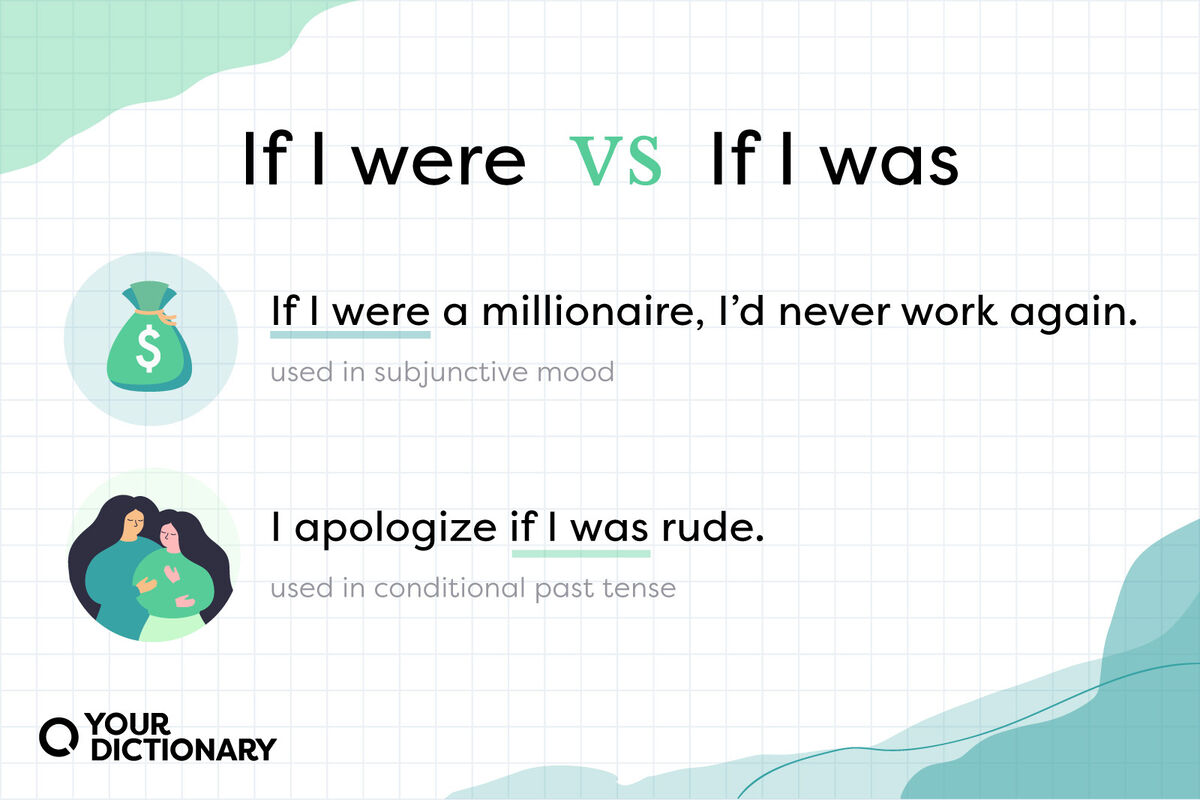
Why do you say if I were when you would never say I were? And why is it more correct than if I was in some cases? Keep reading to learn when if I were is appropriate — and how to tell if you’re using it correctly in the conditional or subjunctive moods.
If I Was vs. If I Were
Many people use if I was and if I were interchangeably to describe a hypothetical situation. The confusion occurs because when writing in the past tense, I was is correct while I were is incorrect. However, when writing about non-realistic or hypothetical situations, if I were is the only correct choice.
Even though they look almost identical, if I was and if I were are not interchangeable. The way you use them depends on the mood of your sentence. If I were is appropriate in the subjunctive mood, while if I was is only acceptable in conditional past-tense sentences. Let's look further into how to use the conditional if I were vs. if I was correctly in a sentence.
When to Use If I Was
You can use if I was in past-tense, first-person sentences that describe something the speaker was or has done. The conditional conjunction if indicates that one action in the sentence depends on another. For example:
- I apologize if I was rude.
- I’ll let you know if I was accepted into the graduate program.
- The teacher will increase my grade if I was correct on the first question.
- I’ll fix the error if I was mistaken.
The phrase if I was always comes before an adjective phrase that further describes the speaker. The word was indicates that the situation is likely and realistic. None of these sentences would be correct with if I were.
When to Use If I Were
If you’re trying to describe a hypothetical or doubtful situation, also known as the subjunctive mood, use if I were. Unlike sentences with if I was, these are cases that are contrary to current fact. Some if I were examples include:
- I bet Henrietta would go out with me if I were taller.
- I would focus on foreign policy if I were the president.
- If I were a millionaire, I’d never work again.
- I’d vote for the senator if I were sure that he wouldn’t raise taxes.
- If I were more like my sister, I’d have won that scholarship for sure.
These sentences are in both conditional (one action relies on another) and subjunctive (the if I were clause is contrary to fact). You could follow each statement with “But I’m not.” This is the easiest way to tell whether you are using if I were correctly.
More About Grammatical Moods
Mood in writing isn’t just how the author wants you to feel. A sentence’s mood indicates the writer’s tone and how they want the reader to receive the message. There are several different grammatical moods that range from factual statements to commands.
- Indicative: A straightforward statement. (I am going to the dance.)
- Imperative: A command. (Go to the dance.)
- Interrogative: A question. (Are you going to the dance?)
- Conditional: A statement in which one action depends on another event. (I would go to the dance if Brian asked me.)
- Subjunctive: A hypothetical statement. (If I were you, I’d go to the dance.)
Each of these types of sentence sends a different message to the listener or reader. Sometimes punctuation helps to set the mood, as does syntax. But in cases like the subjunctive or conditional moods, you need to know what verb conjugations and contractions to use.
Conditional vs. Subjunctive Moods
It can be hard to tell the conditional mood and subjunctive mood apart. They both describe situations that may or may not happen. But when you use if I were in a sentence, you’re writing in both the conditional and subjunctive moods.
Examples of Sentences in Both Moods
Sentences in the conditional mood include words like would, could, and should. Take a look at this example of a sentence in the conditional mood.
I would buy that car if I could afford it.
The speaker is saying that one action (buying a car) depends on another action (affording it). The word would indicates that the sentence is in the conditional mood. But if you change if I was to if I were, the sentence becomes subjunctive:
I would buy that car if I were richer.
In this case, the conditional action (buying a car) depends on a wishful situation (being richer). The fact that the second clause is unlikely or hypothetical makes the sentence both subjunctive and conditional.
Here are some more sentences that become both conditional and subjunctive with if I were.
- Armin would fall in love with me if I were more beautiful.
- If I were single, I’d still live downtown.
- I would tell you if I were going to the party.
- If I were trapped on a deserted island, I’d bring matches and bottled water.
More Grammar Resources
If there are other grammar concepts that confuse you, you’re in the right place. A helpful article provides examples to clear up the difference between their, there, and they’re. You can also learn how to use use to vs used to correctly in a sentence.